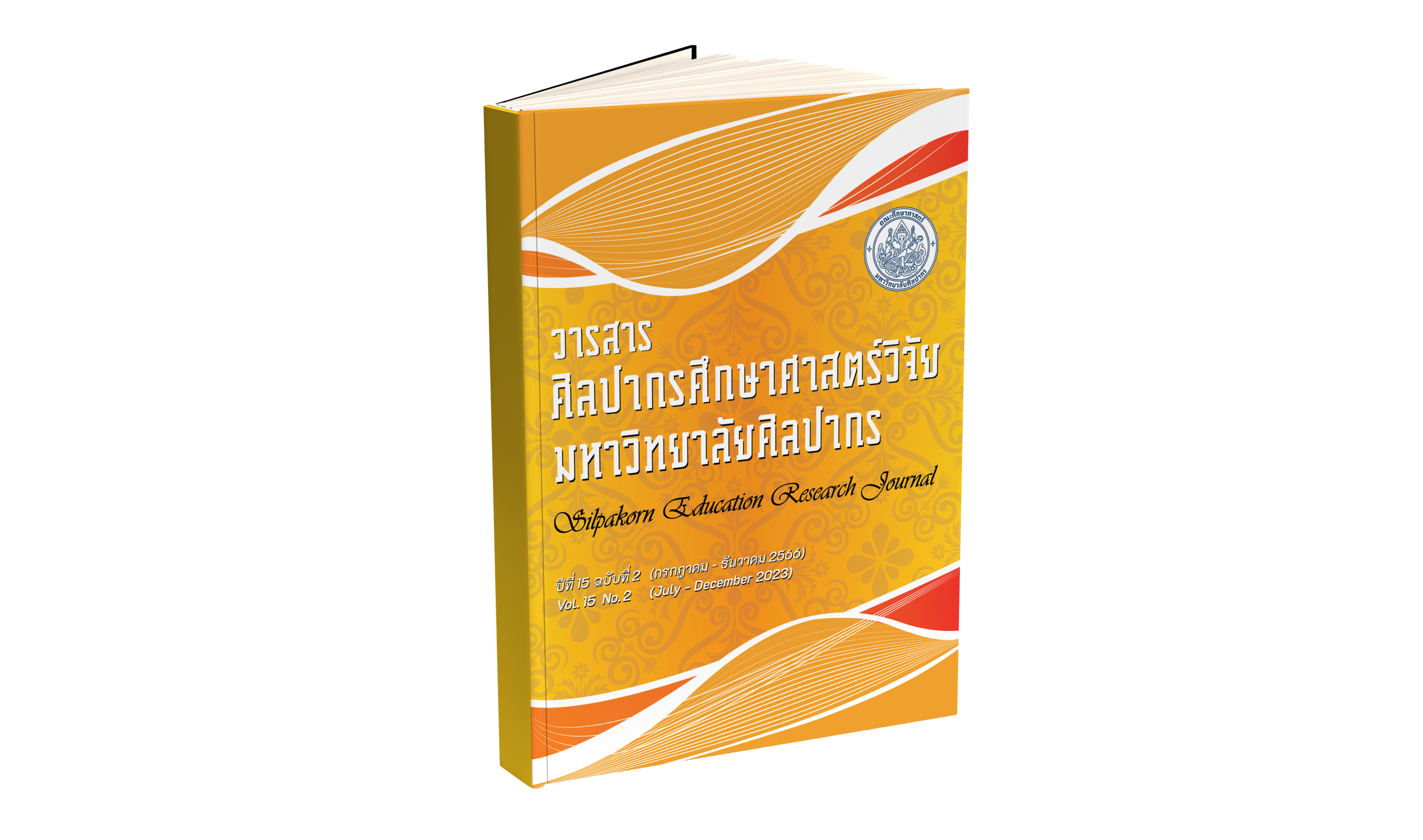ผลการจัดการเรียนรู้แบบร่วมมือด้วยเทคนิคแบ่งกลุ่มผลสัมฤทธิ์ร่วมกับแอปพลิเคชันพลิกเกอร์ ที่มีต่อผลสัมฤทธิ์ทางการเรียนและความคงทนในการเรียนรู้วิชาสังคมศึกษา ของนักเรียนชั้นประถมศึกษาปีที่ 5
คำสำคัญ:
การจัดการเรียนรู้แบบร่วมมือ, เทคนิคแบ่งกลุ่มผลสัมฤทธิ์, แอปพลิเคชันพลิกเกอร์, ความคงทนในการเรียนรู้บทคัดย่อ
การวิจัยนี้มีวัตถุประสงค์เพื่อ 1) เปรียบเทียบผลสัมฤทธิ์ทางการเรียนของนักเรียนก่อนและหลังการจัดการเรียนรู้แบบร่วมมือด้วยเทคนิคการแบ่งกลุ่มผลสัมฤทธิ์ร่วมกับแอปพลิเคชันพลิกเกอร์ 2) เปรียบเทียบผลสัมฤทธิ์ทางการเรียนของนักเรียนที่ได้รับการจัดการเรียนรู้แบบร่วมมือด้วยเทคนิคการแบ่งกลุ่มผลสัมฤทธิ์ร่วมกับแอปพลิเคชันพลิกเกอร์กับเกณฑ์ร้อยละ 70 ของคะแนนเต็ม และ 3) ศึกษาความคงทนในการเรียนรู้ของนักเรียนที่ได้รับการจัดการเรียนรู้แบบร่วมมือด้วยเทคนิคการแบ่งกลุ่มผลสัมฤทธิ์ร่วมกับแอปพลิเคชันพลิกเกอร์ กลุ่มตัวอย่าง คือ นักเรียนชั้นประถมศึกษาปีที่ 5 โรงเรียนบ้านเขาวง จำนวน 30 คน ที่ได้มาจากการสุ่มแบบกลุ่ม เครื่องมือที่ใช้ในการวิจัย ได้แก่ แผนการจัดการเรียนรู้ และแบบทดสอบวัดผลสัมฤทธิ์ทางการเรียน การวิเคราะห์ข้อมูลโดยใช้ค่าเฉลี่ย ค่าส่วนเบี่ยงเบนมาตรฐาน การทดสอบค่าทีกรณีกลุ่มตัวอย่างไม่เป็นอิสระต่อกันและการทดสอบค่าทีกรณีกลุ่มตัวอย่างเดียว
ผลการวิจัยพบว่า 1) นักเรียนที่ได้รับการจัดการเรียนรู้แบบร่วมมือด้วยเทคนิคแบ่งกลุ่มผลสัมฤทธิ์ร่วมกับแอปพลิเคชันพลิกเกอร์มีผลสัมฤทธิ์ทางการเรียนหลังเรียนสูงกว่าก่อนเรียนอย่างมีนัยสำคัญทางสถิติที่ระดับ .05 2) นักเรียนที่ได้รับการจัดการเรียนรู้แบบร่วมมือด้วยเทคนิคแบ่งกลุ่มผลสัมฤทธิ์ร่วมกับแอปพลิเคชันพลิกเกอร์มีผลสัมฤทธิ์ทางการเรียนหลังเรียนสูงกว่าเกณฑ์ร้อยละ 70 ของคะแนนเต็มอย่างมีนัยสำคัญทางสถิติที่ระดับ .05 3) นักเรียนที่ได้รับการจัดการเรียนรู้แบบร่วมมือด้วยเทคนิคแบ่งกลุ่มผลสัมฤทธิ์ร่วมกับแอปพลิเคชันพลิกเกอร์มีความคงทนในการเรียนรู้หลังผ่านไปแล้ว 2 สัปดาห์
เอกสารอ้างอิง
Adams, J. A. (1976). Human Memory. New York: McGraw Hill.
Chanluang, W. (2017). “Development of Learning Activities to Promote English Vocabulary Retention for Mattayomsuksa 3 Students through STAD Co-Operative Learning Techniques”. Journal of Roi Et Rajabhat University 11(2): 207–217. (in Thai)
Chukrua, S. (2019). “Plickers (Application) Online Tools for Teaching and Learning”. Multimedia E-News 65: 1-41. [Online]. Retrieved April 11, 2022, from https://muit.mahidol.ac.th/ enews/multimedia/download/201903.pdf.
Chitchayavanich, K. (2019).Learning Management.Bangkok: Chulalongkorn University Press. (in Thai)
Dinh Thi Thanh, X. (2017). “A Study of Learning Achievements on About ASEAN and Satisfation to Learning of Prathomsuksa 6 Students Using Cooperative Learning with STAD Technique”. Ratchaphruek Journal Nakhon Satchasima Rajabhat University 15(2): 95-103. (in Thai)
Kowtrakul, S. (2002). “Educational Psychology” Bangkok: Chulalongkorn University Press. (in Thai)
Korsripron, K. (2020). “The Development of Learning Achievement in The Development of Southeast Asia of Mathayomsuksa 1 Students by Using Cooperative Learning Management Using STAD Technique”. Education Journal Faculty of Education Nakhon Sawan Rajabhat University 3(1): 13-28. (in Thai)
Khammanee, T. (2017). The Science of Teaching Knowledge for Organizing Effective Learning Process 21th Edition. Bangkok: Chulalongkorn University Press. (in Thai)
Lansak District Primary School Cluster 3. (2022). Lansak District Primary School Cluster 3 Meeting Report. Uthaithani Press. (in Thai)
Ministry of Education. (2008). The Basic Education Core Curriculum B.E. 2551 (A.D. 2008). Bankkok: Printing Press of the Agricultural Cooperative Society of Thailand Ltd. (in Thai)
Office of the Basic Education Commission. (2013). Training Manual for Creating Learning Media to The Tablet. Bangkok: Office of the Basic Education Commission. (in Thai)
Office of the Education Council. (2017). The National Scheme of Education B.E. 2560-2579 (A.D. 2017-2036). 1th edition. Bangkok: Prikwarn Graphic. (in Thai)
Paliang, K. (2019). “The Study of Learning Achievement Subject: Social Studies Topic: Geography of North America Mattayomsuksa 3 by using Student Teams-Achievement Divisions Activity (STAD)”.Journal of Educational Administration and Supervisor Mahasarakham University 10(1): 7-18. (in Thai)
Phinla, W. (2017). “Guidelines for Learning Management in Social Studies in the Development of Critical Thinking Skills for the 21st Century Learners”. Parichart Journal Thaksin University 30(1): 13-34. (in Thai)
Phinla, W. and Phinla, W. (2018). Social Studies Learning Management In The 21st Century. Bangkok: Chulalongkorn University Press. (in Thai)
Suriwongkhan, C. (2020). “The Comparison of Mathematical Achievement and The Ability in Mathematical Communication and Presentation on Statistic for Mattayomsuksa 3 Students Between STAD and Tradition at Learning Activities Approach”. Rajabhat Maha SaraKham University Journal 14(3): 115-126. (in Thai)
Sayapat, S. (2021). “A Student of The Plickers Application towards Learning in Subject Buddhist of Mattayonsuksa 5 Students in Srikranualwitthayakhom School”.Journal of Buddhist Education and Research Language Institute Mahachulalongkornrajavidyalaya University Khon Kaen Campus 7(1): 62-70. (in Thai)
Slavin, R. (1995). Cooperative Learning : Theory, Research and Practice. (2nd ed). Massachusetts: A Divisions of Simon and Schuster.
Suttirat, C. (2018). 80 Innovative Learning Management that Focuses on Learners. 8th edition. Nonthaburi: P Balans Design and Printing. (in Thai)





